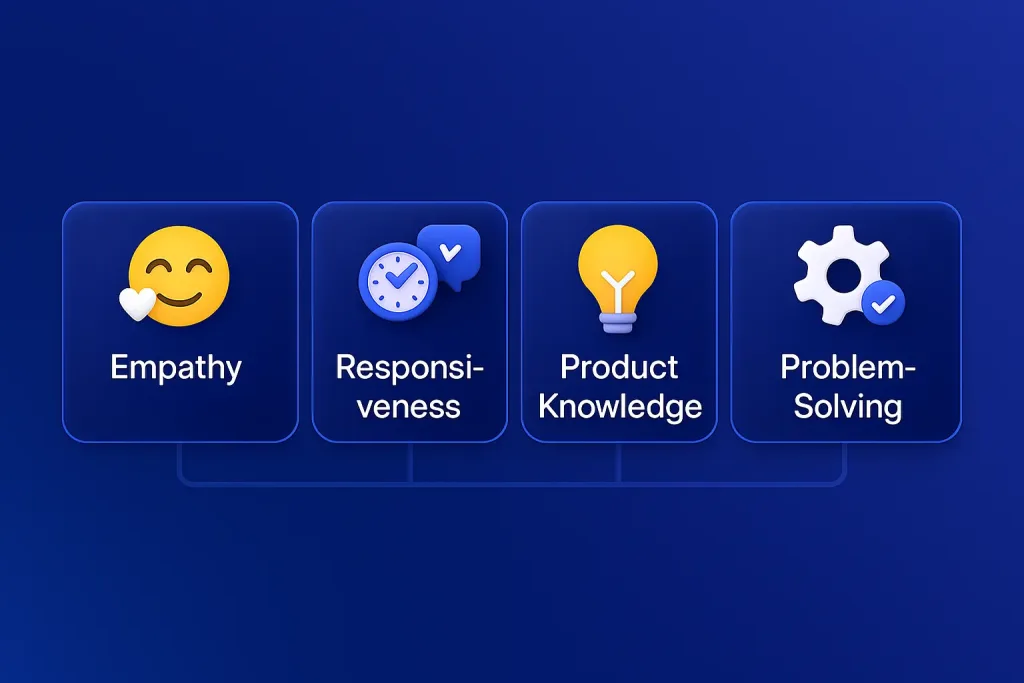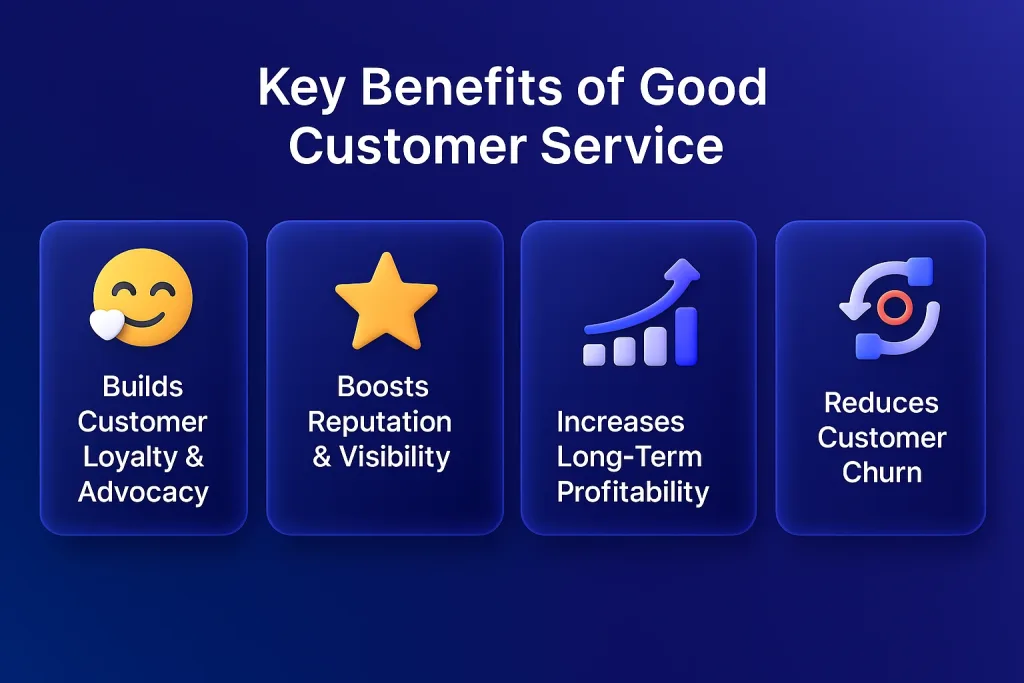15 Ways to Deliver Good Customer Service
- June 12, 2025
- 14 mins read
- Listen

Do you know that good customer service is vital for any successful business? It is the foundation upon which lasting customer relationships are built, fostering loyalty, trust, and satisfaction. These days, consumers have a myriad of options at their fingertips, and providing exceptional customer service is not just a nicety but a necessity.
According to HubSpot Research, 93% of customers are likely to make repeat purchases with companies that offer excellent customer service. It encompasses a wide range of practices and principles aimed at meeting and exceeding customer expectations at every touchpoint.
In this article, we will explore the key elements of good customer service and discuss why it is paramount for businesses striving for long-term success.
What is Good Customer Service?
Good customer service means providing assistance and support to customers throughout their entire journey with your company. It’s about ensuring help and value to them at every step, from initial inquiry to post-purchase follow-up. Understanding customers’ needs, addressing their concerns effectively, and exceeding their expectations are also key aspects of good customer service.
15 Ways to Deliver Great Customer Service
Customer expectations are rising exponentially, and offering good service is the only way to keep pace. Since most companies aim to step up their customer service game, you too should not lag behind and rather find ways to stand out.
Let’s look at 15 ways to deliver excellent customer service:
1. Support Customers on Their Preferred Channels

Customers are quite choosy these days, and most of them expect help/support on the channels of their choice. They want businesses to be active on popular platforms – like social media, live chat, email, or phone – to offer quick help.
To offer great customer service, it’s important to respond to customers based on the urgency and complexity of their issue. So, for example, if a customer wants to connect over social platforms for a quick chat or wants a phone conversation, make sure you meet their needs for a good service experience.
However, supporting customers on their preferred channels is easier said than done unless your team is equipped to handle customers across all major channels. In addition, you should also have the right technology to switch between channels easily and offer support the way customers expect.
There are popular tools like REVE Chat that can help you support customers on different channels and enhance their service experience. These tools can let you integrate various platforms into a single dashboard and manage interactions easily.
2. Add Value to Customers with an In-depth Understanding of Your Solution

Offering great customer service is much more than just solving issues. It involves going out of the way to guide users, offer them deep insights, and help them get value from the money they have spent on your product or service.
To do all this, you should first gain in-depth knowledge of your offering. This will be key to explaining features clearly to customers. An inside-out knowledge of your product or service is the only way you can suggest relevant use cases to customers.
The better you understand your solutions, the more effectively you will resolve technical issues, resulting in higher levels of customer satisfaction. In addition, customers will trust your support more when you know every aspect of your offering.
3. Maintain a Positive Attitude
Positive interactions lay the groundwork for excellent customer service. And such interactions can only be driven by a team that wears a positive attitude.
This is why you should maintain a positive and friendly demeanor in all customer interactions, even in challenging situations. It sets the tone for a pleasant and productive interaction.
Your positive attitude will play a huge role in diffusing tension, building trust, and leaving a lasting impression on customers. Adopting this type of attitude means greeting customers warmly with a smile and a friendly tone of voice, and using positive language to convey enthusiasm and a willingness to assist.
Even in stressful situations, you must maintain a calm and composed manner to show professionalism and care. The most important aspect is to focus on finding solutions rather than dwelling on problems.
And always express gratitude for the customer’s business, regardless of the channel you interact with or the outcome.
4. Personalize the Experience
As per a Deloitte report, companies that excel at personalization are 71% more likely to report improved customer loyalty.
This shows you should stop generalizing customers and rather start treating them as individuals. Personalizing the service experience is a great way to make customers feel special and show them that you care.
To personalize customer experiences, you need to leverage their past interactions, unique preferences, and specific needs. This is why data plays a key role in personalizing customer service. A support team with access to customer data can deliver relevant responses and improve their experience with your brand.
Popular tools like REVE Chat can be used to offer customers a personalized experience across multiple channels. Using these tools, customer service agents can view customer-related information and tailor experiences to individual needs. Agents can utilize features like proactive chat or automated responses to serve customers contextually.
5. Respond Promptly
Quick and timely responses are one of the key elements of great customer service. They have a critical role in shaping the customer service experience. When you address customer issues promptly, it shows you value their time and prioritize their problems. Sometimes, even a quick acknowledgement from you can enhance the customer service experience, even if you take time to resolve the issue.
However, responding promptly does not mean compromising quality; rather, you should take time where needed for better resolution, but make sure customers feel like their issues are paid attention to quickly. Similarly, attempts to meet a response time goal might jeopardize customer service quality and experience.
To respond promptly, give your service team access to advanced tools and workflows. Make sure you can quickly react to customer data and maintain the required speed and quality in offering excellent customer service.
Consider investing in top solutions like REVE Chat so that your support team can have smooth access to chat history and deliver quick responses.
6. Maintain Consistency with Every Service Interaction
Being consistent in every customer interaction is one of the most effective ways to deliver good customer service. Consistency in service delivery builds trust and reliability with customers.
It assures that every interaction, whether in-person, over the phone, or online, meets a certain standard of quality and helps establish your brand as dependable and customer-focused.
You should develop standardized processes and procedures for delivering service to ensure consistency across all customer interactions. In addition, consider implementing quality assurance measures such as regular monitoring, feedback sessions, and performance evaluations to maintain consistency and identify areas for improvement.
7. Actively Listen
Customers feel heard and valued when you actively listen to them or their problem. It builds trust and shows that you have genuine care about them. This is why you must pay full attention to what the customer is saying without interrupting. Only then can you offer good customer service.
The key is to acknowledge their concerns and clarify any points if necessary. This helps build rapport and ensures you understand their needs accurately. During face-to-face conversations, maintain eye contact and give your full attention to the customer to show that you are engaged.
When engaging over live chat or phone, paraphrase what the customer says to ensure you understand correctly, and ask clarifying questions to delve deeper into their concerns. It’s important to avoid interrupting or jumping to conclusions before the customer finishes speaking.
Irrespective of the situation or channel, you must use affirmative gestures like nodding to demonstrate attentiveness and reinforce that you are actively listening. This will help you offer quicker, more accurate resolutions, resulting in an improved overall service experience.
8. Practice and Prioritize Empathy in Customer Interactions
Empathy is a key element of great customer service. It’s about putting yourself in the customer’s shoes and trying to understand their perspective. You should always try to show genuine concern for their issues or frustrations and express empathy in your interactions. This helps customers feel valued and understood.
Prioritizing empathy in every interaction means you must validate the customer’s feelings by acknowledging their emotions. It’s equally important to use phrases like “I understand how you feel” or “That must be frustrating” to show you relate to their situation.
Make sure to avoid dismissive language and never downplay the customer’s concerns. In every situation, try to express genuine concern and a willingness to help resolve their issue. Showing empathy can help you overcome complex situations and turn them into a positive experience for customers, whether they seek help or feel frustrated.
One of the main purposes of prioritizing empathy is to go beyond rigid policies and provide flexible solutions that can ensure a great customer service experience. This is how empathy can help you not only resolve issues effectively but also forge a long-lasting bond of trust with your customers.
9. Empower Your Team to Solve Problems Independently
Being able to resolve customer issues and address their concerns promptly and effectively is crucial for providing excellent customer service. This involves not just active listening and empathy, but also the support to be creative and offer out-of-the-box solutions.
To achieve this, you should empower support teams to take ownership of customer issues and resolve problems autonomously within well-defined guidelines. It’s equally important to encourage a culture of continuous improvement through regular reflection and sharing of success stories and learning from past interactions.
In addition, make sure your support agents have easy access to the right tools, resources, and training. This will prepare them to act quickly and decisively, resulting in a better service experience for customers.
Investing in top solutions like REVE Chat is the right step towards empowering your support team by giving them access to tools like live chat, co-browsing, and AI chatbot support. These tools can help teams resolve issues faster and more efficiently.
10. Follow-up with Customers After Service Interaction
Following up with customers after a sale or service interaction is fundamental to offering excellent customer service. It shows that you value their feedback and are committed to their satisfaction. This could involve checking in to see if they’re satisfied with their purchase, or addressing any further concerns, or simply expressing gratitude for their business.
You can use advanced tools to personalize follow-up interactions based on the customer’s preferences and previous interactions to demonstrate genuine care and attention.
In addition, you can follow up with customers promptly after their initial inquiry, purchase, or service interaction to show that their satisfaction is a priority. It’s a good idea to offer additional value during follow-up interactions, such as helpful tips, exclusive offers, or relevant resources, to further enhance the customer experience and build rapport.
11. Introduce Gamified Engagement to Drive Loyalty
Great customer service is not just about resolving issues. It’s about creating lasting experiences. One effective way to engage customers is by introducing gamification into your service strategy.
By adding game-like elements such as reward points, badges, or tier-based memberships, you can turn standard service interactions into exciting experiences. Gamification gives customers a reason to return, interact more frequently, and build a stronger emotional connection with your brand.
Make sure your team uses tools or CRM systems that track progress and reward behaviors like repeat purchases or referrals. These small touches can elevate the entire customer journey and make service more rewarding.
12. Leverage Predictive Analytics for Proactive Support
The best customer service often happens before the customer reaches out. Predictive analytics allows businesses to analyze historical behavior, customer feedback, and interaction trends to anticipate potential issues before they occur.
With the right AI-powered tools in place, your team can offer proactive assistance, such as notifying users about expiring subscriptions, spotting unusual account activity, or recommending relevant upgrades. This shows customers that you are thinking ahead and care about their experience.
Proactive service not only minimizes frustration but also boosts trust, making customers feel that their needs are being prioritized without even asking.
13. Use AI Assistants and Voice Bots for Instant Help
As customers expect instant support, anytime and anywhere. Integrating AI assistants and voice bots into your customer service channels can help meet this demand efficiently.
AI chatbots can handle frequently asked questions, guide users through simple tasks, and reduce the pressure on your human agents. Voice bots, on the other hand, can offer hands-free support through phone or smart speakers, adding a new level of accessibility.
These tools work best when they’re designed to be conversational and context-aware, ensuring that customers receive fast, relevant responses without feeling like they’re talking to a robot.
14. Design Loyalty Programs That Build Emotional Connection
While discounts and cashback rewards are great, modern customers crave meaningful relationships with brands. Designing loyalty programs that focus on emotional value, such as exclusive access, early product previews, or personalized thank-you messages, can deepen customer engagement.
Such programs go beyond transactions. They make customers feel appreciated, understood, and seen as individuals rather than account numbers. When you show that you genuinely care, customers are more likely to stick around, forgive occasional mistakes, and become lifelong brand advocates.
Be sure to use customer insights and interaction history to personalize rewards and offers that truly matter to each customer.
15. Collect Customer Feedback
Collecting customer feedback is one of the key elements of good customer service. It demonstrates your willingness to improve and adapt to their needs. This could be done through surveys, feedback forms, or simply asking customers for their input at the end of an interaction.
You can utilize this feedback to make necessary changes or improvements, showing dedication to providing exceptional service. However, you should make it easy for customers to provide feedback by offering multiple channels of communication, such as surveys, feedback forms, email, social media, or direct contact with customer support.
In addition, you must demonstrate to customers that their feedback is valued by taking prompt action on their suggestions, addressing concerns, and implementing changes based on their input.
It’s equally important to express gratitude to customers for taking the time to provide feedback. Whether positive or negative, reassure them that their opinions are essential for driving continuous improvement.
Key Benefits of Good Customer Service

Good customer service is vital for businesses as it directly impacts customer satisfaction, loyalty, reputation, and overall success. It helps differentiate a company from its competitors, drives retention, and fosters positive brand perceptions. By prioritizing excellent service, businesses can build strong relationships, drive growth, and establish a competitive advantage.
Let’s look at some key benefits of good customer service:
- Helps create satisfied customers who are more likely to become repeat customers and brand advocates
- Enhances reputation through word-of-mouth recommendations and online reviews
- Serves as a differentiator in a competitive marketplace
- Contributes to long-term profitability through increased customer lifetime value
- Minimizes customer churn by addressing issues promptly and making customers feel valued
Final Thoughts
Providing good customer service is not just about resolving complaints or answering inquiries; it’s about creating meaningful connections and memorable experiences that keep customers coming back time and time again. In this blog, we have discussed good customer service in detail, explored its definition and key elements, and also touched upon benefits and tips for delivering excellent customer service.
At REVE Chat, we understand how leveraging advanced customer service tools and technology can help businesses differentiate themselves from competitors, build brand loyalty, and ultimately drive growth and profitability. We are one of the top platforms with a range of tools like live chat, chatbot, ticketing system, and visual engagement tools, to let businesses prioritize the needs and preferences of customers.
So, sign up with us and explore how our tools can help you offer exceptional customer service in every scenario.
Frequently Asked Questions
The five key qualities of good customer service are empathy, clear communication, patience, problem-solving skills, and deep product knowledge. These attributes enable representatives to understand customer needs, convey information effectively, remain calm under pressure, resolve issues efficiently, and provide accurate assistance.
Good customer service involves actively listening to customers, understanding their needs, and providing timely, effective solutions. It emphasizes building trust through empathy, clear communication, and a commitment to exceeding customer expectations.
Words that describe good customer service include attentive, responsive, empathetic, knowledgeable, patient, and proactive. These descriptors highlight a service approach that prioritizes customer satisfaction and effective problem resolution.
Empathy is crucial in customer service as it allows representatives to connect with customers on a personal level, understand their emotions, and respond appropriately. This connection fosters trust and can lead to increased customer satisfaction and loyalty.
Companies can enhance customer service by investing in comprehensive training programs, implementing customer feedback systems, leveraging technology for efficiency, and fostering a customer-centric culture. These strategies help in delivering consistent, high-quality service experiences.



